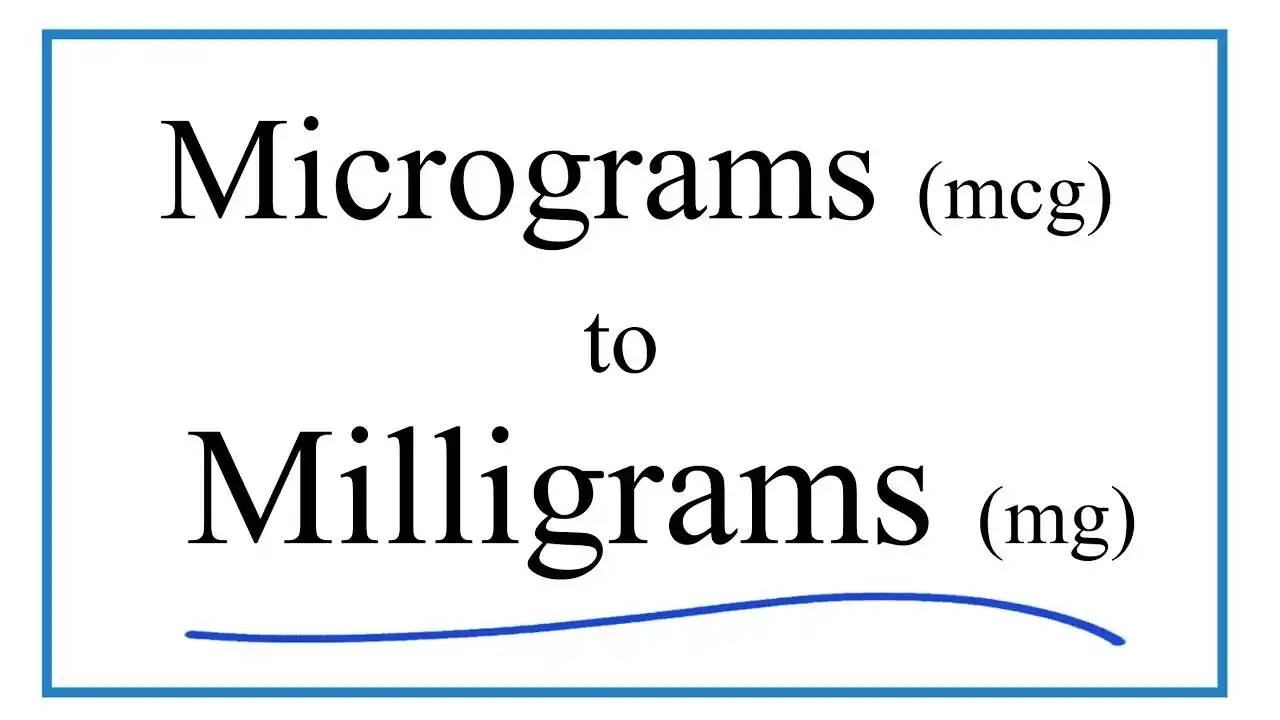🧪 Mcg to Mg Conversion: A Comprehensive Guide
🔍 Understanding Micrograms and Milligrams
In scientific and medical fields, precise measurements are crucial. Two commonly used units for measuring mass are:
- Microgram (mcg): One-millionth of a gram (1 mcg = 0.000001 g).
- Milligram (mg): One-thousandth of a gram (1 mg = 0.001 g).
The relationship between these units is straightforward:
- 1 milligram (mg) = 1,000 micrograms (mcg)
🧮 How to Convert mcg to mg
To convert micrograms to milligrams, divide the number of micrograms by 1,000:
Formula:
Milligrams (mg) = Micrograms (mcg)/1,000
Example:
Convert 2,500 mcg to mg:
2,500 mcg/1,000 = 2.5mg
📊 mcg to mg Conversion Chart
| Micrograms (mcg) | Milligrams (mg) |
| 100 mcg | 0.1 mg |
| 250 mcg | 0.25 mg |
| 500 mcg | 0.5 mg |
| 1,000 mcg | 1 mg |
| 2,500 mcg | 2.5 mg |
| 5,000 mcg | 5 mg |
| 10,000 mcg | 10 mg |
🏥 Practical Applications
1. Healthcare and Medication Dosing
Accurate conversions are vital in healthcare to ensure correct medication dosages. For instance, a prescription might require converting mcg to mg to administer the appropriate dose.
2. Nutritional Supplements
Vitamin and mineral supplements often list dosages in mcg. Understanding conversions helps in determining the correct intake. For example, 400 mcg of folic acid is equivalent to 0.4 mg.
3. Scientific Research
Researchers frequently work with substances in microgram quantities. Precise conversions to milligrams are essential for experimental accuracy.
⚠️ Common Mistakes to Avoid
- Decimal Point Errors: Misplacing the decimal can lead to significant dosing errors. Always double-check calculations.
- Incorrect Conversion Factor: Remember that 1 mg = 1,000 mcg. Using the wrong factor can result in incorrect dosages.
- Unit Confusion: Ensure clarity between to prevent misunderstandings.
🧠 Tips for Accurate Conversions
- Use Reliable Tools: Utilize calculators or conversion tools to minimize errors.
- Double-Check Work: Always verify calculations, especially in critical applications like medication dosing.
- Understand the Context: Be aware of the substance being measured and its required precision.
By understanding and accurately performing it, you ensure precision in various fields, from healthcare to scientific research. Always prioritize accuracy and double-check your calculations to maintain the highest standards of practice.
Converting Feet to Centimeter
To convert feet to centimeters, you can use the conversion factor where 1 foot equals approximately 30.48 centimeters. Therefore, to convert feet (ft) to centimeters (cm), you can use the formula:
- Length in centimeters (cm)=Length in feet (ft)×30.48
For example, to convert 5 feet to centimeters:
- 5 feet=5×30.48 centimeters=152.4 centimeters
This conversion is commonly used in situations where you need to convert measurements between the imperial (feet) and metric (centimeters) systems.






[…] Mcg to Mg […]